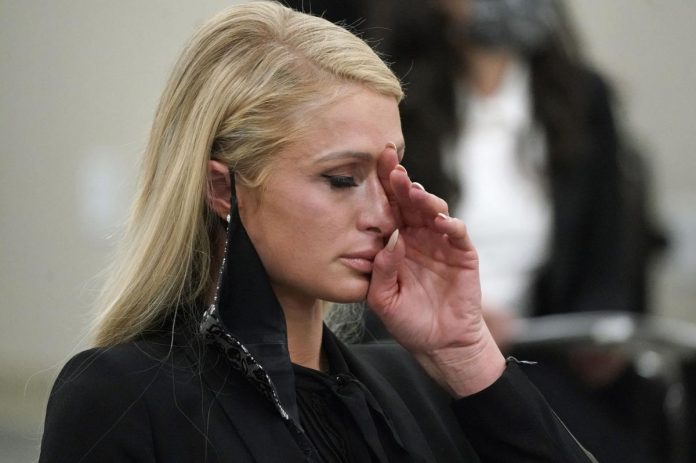Paris Hilton was among a handful of people who testified before the Utah Senate Judiciary, Law Enforcement and Criminal Justice Committee about the abuse and trauma they say they experienced at residential youth treatment centers.
Hilton, who introduced herself as an “institutional abuse survivor,” testified about her time in the 1990s as a 16-year-old at Provo Canyon School in Utah County, where she says she was “verbally, mentally and physically abused on a daily basis.”
The day she arrived, Hilton says she received a bag of clothes with the number 127 on the tag.
“I was no longer Paris. I was only ‘Number 127’,” said Hilton, who previously spoke about her experience at the treatment facility in the 2020 documentary “This is Paris.”
Hilton told lawmakers that she “was forced to consume medication that made me feel numb and exhausted” and didn’t breathe fresh air for 11 months.
“I cried myself to sleep every single night praying I would wake up from this nightmare,” the celebrity said. “The staff there were evil and sadistic, and seemed to enjoy their power and being able to abuse children.”
Hilton was there to speak in support of Senate Bill 127, a bill sponsored by Sen. Mike McKell, R-Spanish Fork, that would increase regulations over the treatment centers, including prohibiting strip and body cavity searches, peer restraints, abuse, neglect and “discipline or punishment that is intended to frighten or humiliate,” including requiring or forcing the child to “take an uncomfortable position” or “repeat physical movements or physical exercises such as running laps or performing push-ups.”
“We’re here to look at our law, the safeguards, the guardrails, that we have in place when we deal with children, children most of whom come from other states in an industry that is large in the state of Utah,” McKell told his colleagues.
“Part of my concern is we have an industry with very, very good actors, but we do have concerns,” the Spanish Fork senator continued. “And the purpose today is to make sure that we address all of those concerns as best we can and put the appropriate safeguards so people can have confidence when they send their children to Utah.”
Draper resident Jeff Netto also testified about his experience as a young teenager in various residential treatment centers in Utah, including the Heritage Community in Provo, where he says he was repeatedly placed in a five-point harness as a restraint method.
“You weren’t allowed to go to the bathroom,” Netto said, his voice quivering. “You would be in your bed, they had plastic sheets, and you would be drugged.”
The Senate committee voted Monday to give a unanimous favorable recommendation to S.B. 127, and lawmakers expressed shock when they heard the testimony of the former residential treatment facility patients.
Sen. Luz Escamilla, D-Salt Lake City, said the bill did not go far enough to regulate the industry, adding that it was “embarrassing” that “this is happening in front of us and we’re not doing enough.”
“As a mother of kiddos, I cannot even imagine any of my six kids going through this hell,” said Escamilla.
In a written statement in October 2020, Provo Canyon School said it was sold by its previous ownership in August 2000 and “therefore cannot comment on the operations or patient experience prior to that time.”
“What we can say is that the school provides a structured environment teaching life-skills, providing behavioral health therapy, and continuing education for youth who come to us with pre-existing and complex emotional, behavioral and psychiatric needs,” the statement said. “These youth have not been successful in typical home and school environments, and in many cases have a history of engaging in dangerous behaviors such as self-harming and/or attempting suicide, physical violence and/or aggression toward others, and use of illicit substances.”
The statement continued, “While we acknowledge there are individuals over the many years who believe they were not helped by the program, we are heartened by the many stories former residents share about how their stay was a pivot point in improving — and in many cases, saving — their lives.”








